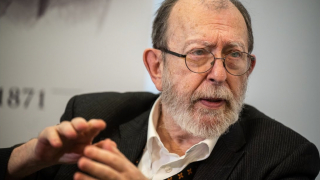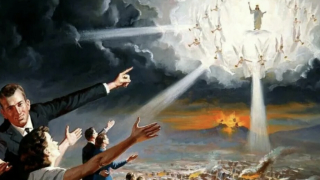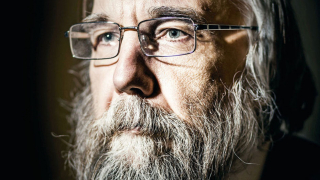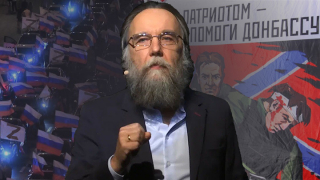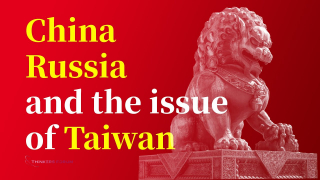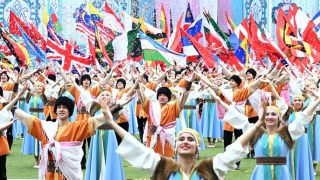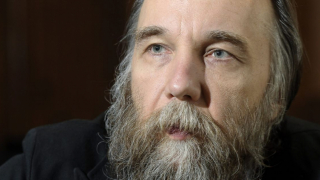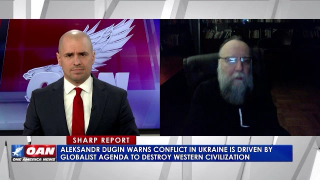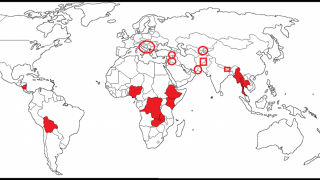Perhaps the last chance
Has the mouse isolated the elephant?
Before addressing the question of what process Russia represents in the global framework today, we should look at those who seek to destroy this process. Western elites keep repeating that Russia should be isolated, but in general it remains a statement. Why?
"We have become pariahs and they have managed to isolate us, but that is from their point of view. It is not what it is, but what society thinks it is. The West thinks it has isolated us. Because a significant number of world elites, not just Western elites, but world elites in general, are actually under the direct hegemony, under the direct control of the West. And at the level of elites, at the level of subordination to the decision-making centre in Washington, you can really see a strict discipline. If they say they are isolating Russia, they have done it, they have isolated it,' - Alexander Dugin outlined this process.
But who proclaimed this isolation? According to the professor, it is only a handful of elite representatives who have no real legitimacy. The professor gave an example: half of the US population is now in favour of Joe Biden, while the other half, perhaps the largest, is in favour of Donald Trump.
In other words, the ruling elites now speak not just for the world, but not even for America. Not even for half of America, if you take out the left-wing supporters and so on, but for a quarter of America. And they, this quarter of America, who represent the globalist elite, are the ones who have isolated us,' Dugin explained.
It is logical that to compensate for the imbalance of their influence not in their favour, they have to fight bitterly for their ideals. And to do so, they are using all possible means today, including modern digital platforms, believes the director of the Tsargrad Institute.
These global elites, being in a significantly weakened position in terms of sentiment in their societies, are further radicalising the means under their control to convey their position. Hypnosis and hallucinations are taking place. And on the networks, on Facebook*, on Twitter**, there is a pessimisation of Google queries. These platforms are becoming more and more totalitarian. That's where the real propaganda is taking place. The elites are trying to create the image that they have isolated us, maintained their legitimacy and continue to rule the world. This is the totalitarian aspect of liberal politics,' Dugin concludes.
And why is the sober population of Western countries now rising up against these totalitarian liberal elites? Probably because the rose-tinted spectacles of the inhabitants of this world have shattered and they have realised who they are dealing with. Not all of them and not completely, but still. This is how Konstantin Malofeev described the representatives of the Western elites:
These are the people who since the end of the Great Patriotic War have sparked dozens of conflicts, killed millions of people and continue to call themselves the light of all that is good and kind. So they will continue to lie, not surprisingly'.
This, in his view, is what distinguishes our multipolar world from the totalitarian-liberal western world. Hence the objectives pursued by these worlds. Ours are presented quite clearly, while those of the West are perhaps limited almost exclusively to demagogic narratives and attempts to maintain their influence in the world. And Europeans are beginning to realise that they have entered a zero-sum game.
For in our case, we have a holy war with holy goals. We are fighting for our land, for our people, for our history, for our culture, for our future. And they are fighting in the middle of nowhere. They are trying to create artificial meanings and artificial goals, for which they are supposedly fighting, but in reality most Europeans do not support this, do not support these goals. They are not ready, they are ready to nod when mass propaganda is directed at them,' Malofeev concluded.
Russia's triad of multipolarity and normality
So what does Russia offer the world, so much so that even many residents of the Western liberal enclave are now ready to join it? The question was answered by Nikolai Malinov, a Bulgarian citizen, who is able to measure the ideas of multipolarity with his own pan-European yardstick.
Malinov recalled the triad that can describe the goals pursued today not only by Russia, but also by other countries. In his view, it is about dignity, a strong state and traditional values.
For them, there is only one danger to Russia. This danger is spiritual. Russia provides the model that opposes unipolarism. A model that is universal throughout the world. It is universal for China, for Africa and for Latin America. It is a model of dignity. We defend our identity. We suffer to defend our identity.
We preserve our dignity. Russia defends the idea of a strong state and the idea of traditional values. And this triad is simply unbeatable. And the unipolarists have nothing to oppose,' said Malinov.
Even if, at the same time, they are trying to fight multipolarism by 'abolishing' everything Russian, because they understand the power centre to be hit today. The leader of the 'Russophiles' in Bulgaria noted that under the cover of free speech ideas they censor the First Channel or VGTRK; the principles of free speech do not apply to them. They also try to 'abolish' Russian culture, which is not related to European freedoms.
If you are for Pushkin and Tchaikovsky, it does not concern you. It is about Mozart, Wagner and all the others. But everything Russian should be wiped off the face of the earth, cornered, he said.
At the same time, it is wrong to portray multipolarism as an exclusively pro-Russian movement. Malinov recalled that Bulgarians among the supporters of Russophiles are first and foremost Bulgarian patriots. They see the fight for multipolarism as a battle for their dignity, their political and cultural identity. In Bulgaria, he says, the number of supporters of multipolarism is only growing.
The people vehemently oppose the hegemony of the West. I give just one example. We organise events every month. One of these was held last Sunday in forty cities. This time there were 6,000 people, a month ago 15,000, according to police calculations. Central TV says: dozens of Bulgarians came out to protest against Putin's war in Ukraine. So much for democracy. But the people are coming out. They want to be with Russia, he said.
Nikolay Malinov also made, in our opinion, a very important point. To make it, one had to be a representative of another country, because in Russia the battle for multipolarity is often perceived exclusively in terms of a confrontation between Russia and the West. At the same time, in the eyes of a Bulgarian, Russia is not only fighting for itself.
"I would say that Russia is synonymous with normality. Because it is not a normal state in the world community when there are sanctions. It is abnormal when the established international fora, created for humanity to live in peace and prosperity, do not discuss peace, prosperity and sustainable development at all. From this point of view, Russia, if we want to say in one sentence what it offers the world, only wants normality. That there are no sanctions, that there is normal dialogue, that everyone defends their own identity, their own point of view, and that there is some consensus in the dispute,' Malinov said.
This idea was supported by Konstantin Malofeev, who noted that even in the United States there is a 'healthy part of the establishment', which would like a fair and multipolar future for its country:
Trump is the representative of this. And it is not that he is a Russophile. Nor is he a 'Judeophile', given the money with which he was elected. He is just an Americanist. He just wants America to become a respected pole in this world. Not a defeated hegemon that everyone will kick around throughout the 21st century.
Russia as a multiplier of processes in the world
Another question that many people trying to understand the processes taking place in the world are probably asking themselves: why are the supporters of multipolarism in various countries not raising their own powerful anti-Western movement, but are currently clustering around Russia? Alexander Dugin gave the answer. Firstly, he noted, the battle of the two worlds is unfolding before our eyes.
Dugin spoke about the role of multipolarism in Europe: 'The two world images have collided with each other. The globalist elites have an agenda. And the whole of humanity has another. They are clashing in the Donbas. Ukraine is not only a field of military confrontation between us and the collective West. It is also a field of confrontation between these two images of the world. After all, in multipolarity, people are not defending Russia, but their own identity'.
An important point is also the following. Russian Foreign Minister Sergei Lavrov and his official representative Maria Zakharova attended both the Founding Congress of the International Russophile Movement, held in Moscow on 14 March and attended by representatives of 42 countries, and the First Global Congress on Multipolarism on 29 April, attended by participants from over 60 countries from all continents.
According to Dugin, the participants in the online marathon were very encouraged by Lavrov and Zakharova's participation because they saw in it an opportunity to really talk, to be heard by the leadership of Russia, a global and nuclear power, which is at the forefront of multipolarism.
So they were not talking to us or about us. Politicians from Pakistan, the US, Japan, Australia, not to mention our friends from China, India, Turkey, Iran, the Arab world, Latin America, were talking about themselves, about their own, they were seeing that Russia is a multiplier of their opinions,' Dugin explained.
The elites of their countries, Dugin noted, repress the supporters of multipolarism, and here, at the marathon, they were approached by the Russian elite, by the foreign minister, who said: please talk, tell us what problems you have in Turkey, in Pakistan, in Africa, in Latin America.
And this is an opportunity for them. So Russia becomes an instrument to recreate justice. We become the platform for the peoples of the world to seek and fight for justice,' Dugin added.
Maria Zakharova: 'Russia fights with love'
For her part, Russian Foreign Ministry spokeswoman Maria Zakharova noted that the West is possessed by an 'impotent rage' against Russia, but cannot do anything about it. In the West it is said that Russia's economy should be 'torn apart', but for 10 years this has never happened.
An absurd statement, this is impotent rage. They seem to have already pressed all the pedals, gas pedal and brake pedal and all that, and they are already hitting themselves - and they continue to follow the savage Russophobic campaign that has been set in motion. And we respond with these events, which are taking place under the auspices of Tsargrad, our compatriots, our Russophiles. No matter how strange it may seem to some, but while we are able to react with strength, and I think we have demonstrated this, both with physical strength and fortitude, we can still really react with love,' she said.
Zakharova noted that in today's world, as in the past, there is nothing more noble than working in the field of anti-fascism. And these people today, just as in the years of the anti-Hitler underground, face pressure, even from their own countrymen.
After all, these are the people who won the right to fight against fascism not from the Nazi troops or the Nazi troops representing Hitler's coalition, but wrested it from their own people. They were clandestine, they were not understood, they were persecuted,' said the Foreign Ministry spokeswoman, commenting on the pressure still exerted on fighters against global fascism.
Zakharova explained that today this struggle is becoming broader, as shown, for example, by the many congratulatory messages she received on Victory Day, 9 May, in which people from different countries wrote to her: 'Only now do we understand what is happening in the world and what we are facing. In her opinion, the confrontation for multipolarism in the world must succeed.
"It is about realising and putting into practice the philosophy of multipolarism, renouncing and throwing off the yoke of domination by one, I cannot say centre of power, but centre of destruction. Multi-polarism as the answer to the chaos of destruction. Multi-polarity as the answer to neo-colonialism. Multi-polarity as a barrier to the logic of domination of the supposedly superior and exceptional over those they consider second class. This is a process that, in my opinion, should have concrete contours. And I am sure it will. The reality is that multipolarism already exists, the only question is that it must take concrete forms, including international legal forms,' Zakharova concluded.
So what?
Of course, these ideological broadcasts on Tsargrad do not happen every day. But they prove the main point: not only was it necessary to organise a Russophile Congress and a marathon on multipolarism, but also to discuss the key aspects regularly, in broadcasts, lectures by Alexander Dugin, books and articles. To give all those interested the opportunity to express themselves.
After all, the West is well aware of this and does not intend to lose the information war. Even if their narratives are already empty and do not carry the original democratic meaning, the principles of free and equal peace. Yet, they keep repeating them over and over again, day after day. The participation of senior Russian officials in events on multipolarism (at the Congress of Russophiles in March, for example, Sergey Lavrov read a greeting from Vladimir Putin) suggests that our country was the first to declare multipolarism as one of the guidelines of its foreign policy concept.
For more on how the multipolarism marathon unfolded, read this article on Tsargrad. We have collected the most impressive and interesting speeches from the forum for you in a special section of Tsargrad.
* Meta, Facebook and Instagram are recognised in Russia as extremist organisations and are banned.
** Blocked on the territory of Russia.
Translation by Lorenzo Maria Pacini


